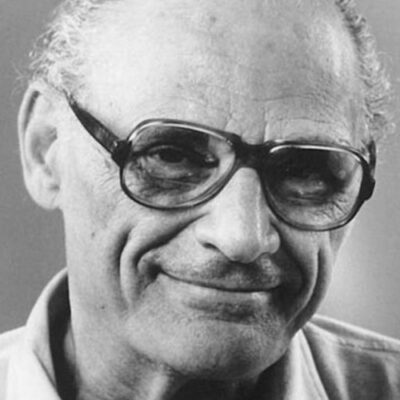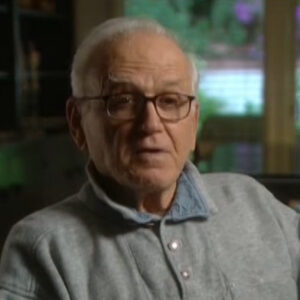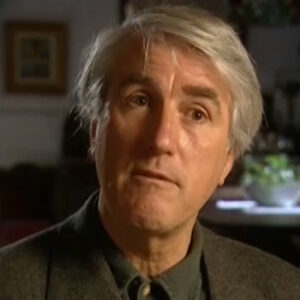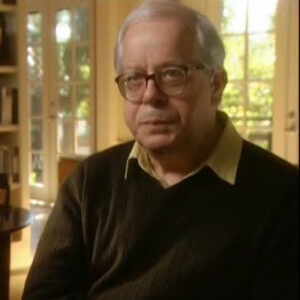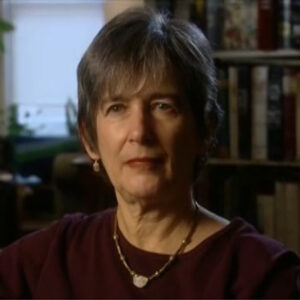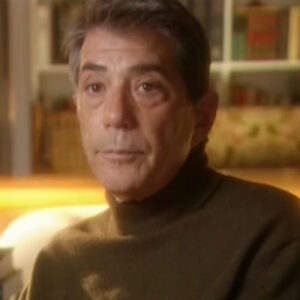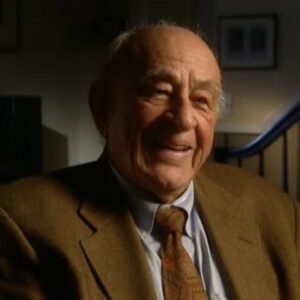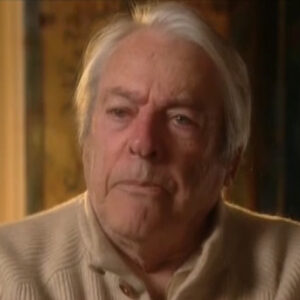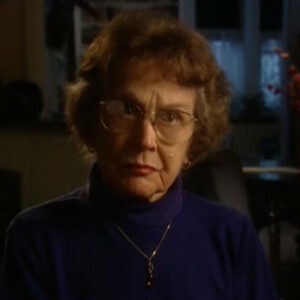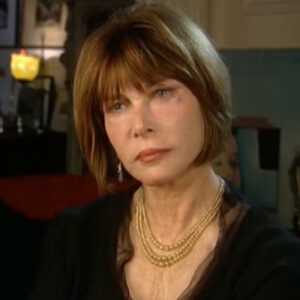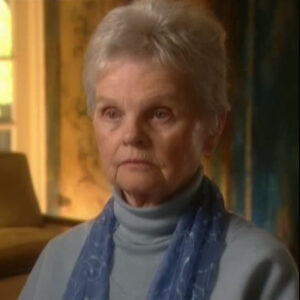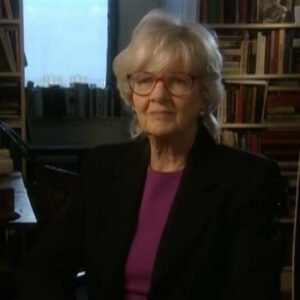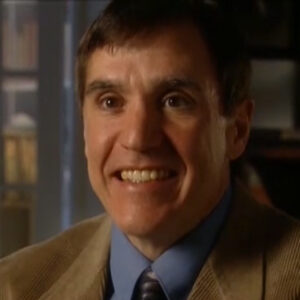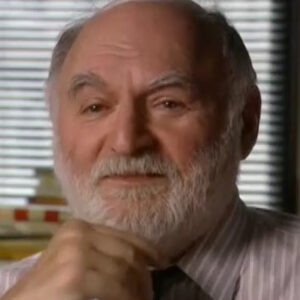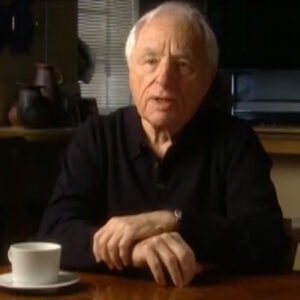Interviewer: Actually, our story about McCarthy in the 50s is a couple of decades earlier. What is it about the Communist Party? What’s going on? What did you hear? What did. What is the party about that would attract somebody like Kazan or like minded people to. I mean, is he looking to overthrow the United States government?
Tom Doherty: Well, one of the reasons I think that the Communist Party is attractive to artists and intellectuals is that artists, intellectuals are attracted to the Communist Party. The American tradition, historically, if you’re a Republican, you celebrate the small business man. If you’re a Democrat, you celebrate the Jeffersonian yeomen. We’re entertainers are basically like trained seals. I mean, they they’re entertainers. They they amuse you, but they don’t have any real political import.
Interviewer: I’m hearing that too much. What what what would draw somebody like Kazan that to the Communist Party in the 30s?
Tom Doherty: Well, Kazan, like a number of artists, intellectuals in the 1930s, was attracted to the Communist Party because it seemed to offer a solution to the economic dislocation of the Great Depression. It opposed fascism overseas and not least the Communist Party, unlike other American political parties, took artists and intellectuals very seriously. The Marxist Leninist branch of communism really saw artists and intellectuals as part of a vanguard elite that could lead the rest of society to the Revolutionary Dawn of Enlightenment. Whereas traditionally Americans had seen entertainers as trained seals as people who could amuse you, but certainly didn’t have any real ideological or political importance.
Interviewer: Is Kazan the kind of guy that is.Is Kazan somebody then who is a member of the party is looking to overthrow. I mean, those guys in the group theatre, are they looking to overthrow the US government?
Tom Doherty: Well, theoretically, they are looking to overthrow the established order that is the United States government in the 1930s. They want a new kind of regime that will bring equality to the masses, that will solve the economic problems of the Great Depression and bring about a more just and fairer society, at least theoretically. That’s the party line.
Interviewer: So they’re not. I mean, Kazan is not a member of something that’s like that, the more liberal version of the Democratic Party.
Tom Doherty: No, the communists were the radical wing of the so-called Popular Front, which is this loose alliance of people on the left, anywhere from like a Roosevelt Democrat to a hardcore communist who are working allegedly for the same purposes, and that is for greater economic justice in the 1930s and to oppose fascism abroad. And that was the philosophy, at least that that could bring about a sort of grand alliance of anybody on the left, broadly speaking, from a traditional Roosevelt Democrat to the hardcore communist xenophobic force. Well, if it Kazans a party member. So presumably, you know, when you. I mean, that’s a serious move. You know, join the party. You attend the meetings. You read all that boring literature that if you’re a communist, we can at least take you at your word that you are seriously engaged in trying to overthrow the United States government as it had been traditionally constructed since 1787.
Interviewer: Your sense then. I mean, what if you can’t give me a portrait of what it means to be a member? Kazan is somebody who is a member for a short time and leaves with a great deal of resentment and repulsion. Why? What is it about being a member that eventually he finds so distasteful?
Tom Doherty: Well, I think the thing that Kazan and other artists found so distasteful about the party in the 1930s is the rigid, intellectual and artistic control that the party demanded of its members, that you really couldn’t be an autonomous artist following your own vision. You always had to follow the party line on any particular issue. And if your issue deviated from the party line, somebody from the party actually had the right under party discipline to tell you to revamp your play, to rewrite your screenplay, to change the lyrics of your song. And if you’re a creative artist that’s following a personal vision and not the socialist vision of the community, then you could see why you’d bridle at this very quickly. Oh, yeah. Yeah. Because Kazan always wanted to follow his own vision and not the party line vision of what drama, what life, what community meant.
Interviewer: So Kazan breaks from the party.
Tom Doherty: Kazan breaks from the party very early. He has like an 18 month or so experience with it and he breaks with the party before the Hitler Stalin pack B before they reversed themselves on intervention in June of 1941. So out of many of the artists, intellectuals in 1930s took much longer to break with the party and many actually didn’t. So Kazan is somebody who very early on is suspicious of the lockstep intellectual and artistic discipline that the party demands. He just does not sustain it as a personal artist.
Interviewer: One of the things also that he talks about and eventually become a real big part of down the road. I want to hold off on his testimony is for lack of a better term, the cloak and dagger stuff. You signed your party card in your name, your alias. I mean, there is this sense that it is secret and that there is. I dont know the word for it is, but.
Tom Doherty: Well, the word you’re looking for is subversive that the party is consciously trying to subvert by secret surreptitious means. American democratic institutions in it. And traditionally in America, we think that anybody can stand up on a soapbox and, you know, spout spout your line that you can organize in the open. And there’s something, you know, at its best. That’s very open and engaging about the American political process. The party really does try to use subterranean and subversive means in order to organize, in order to achieve its ends. So typically say what the Communist Party members of the group theatre after rehearsals, these guys would actually meet in a secret cell to sort of strategize for the best way to take over the group, theater and union. Communist Party members of unions did the same thing where they’d actually come to meetings with a prearranged strategy to take over the meeting. And it was that element of the party that Kazan, I think, found so suspicious and in a way so anti-American. They subterranean subversive means that the party members were willing to use to gain power for any means.
Interviewer: Two things. One is I mean, that’s the moment where he really breaks. They ask him to take over the theatre and he finds it too distasteful and his unwillingness means that he hit by the party and just walks.
Tom Doherty: Right. And anybody who is not willing to subsume their own individual vision or goals to the party is by definition not a loyal party member. And when Kazan comes to that moment after 18 months, he’s got nothing to do but to bolt from the party.
Interviewer: You know, I always find it so completely absurd that the party cares about the group theatre. And here’s. It’s not like the group theatre is like, putting on John Wayne plays. They’re already putting up Clifford Odets. Why take over the group theatre?
Tom Doherty: Well, this is why the I think this is one of the great appeals of the Communist Party for an artist, an intellectual. They really took art seriously. Lenin said, for us, the most important medium is the motion picture. So at the very moment where most Americans thought of Hollywood, is this mindless entertainment machine, this place for diversion. The Communist Party, like the Nazis, knew that film, theater, radio, all the means of popular entertainment were a pivotally important in the transmission of ideology and propaganda that for that, for the Communist Party, entertainment mattered in a way it didn’t matter for either the Republican or the Democratic Party.
Interviewer: So are there tons of communist films in the 30s and 40s coming out of Hollywod?
Tom Doherty: Oh, no. There are no communist films coming out of Hollywood in the nineteen nineteen thirties. Occasionally they’d be able to get a line in or a narrative strain that might seem mildly progressive, but the impact of the communist on film contact content in the 1930s is practically nonexistent. Why? Well, one of the reasons is that Hollywood is a mass entertainment, promulgating reassuring narratives for Americans and most Americans, frankly, are anti-communist. So the notion that Warner Brothers is going to make a movie that will further the aims of Soviet Russia in the middle of the Great Depression is a bit far fetched.
Interviewer: Is there something about the power structure of Hollywood, too, that makes it seem that some screenwriter is going to be able to get?
Tom Doherty: Yeah, I think we always forget that the tour of classical Hollywood cinema was not the director. It was not the screenwriter. It is not the star was the producer. It was the mogul, the guy who’s holding the purse strings.
Interviewer: And they’re?
Tom Doherty: Oh and the moguls, of course, are almost to a man, if they’re not conservative Republicans, their traditional mainstream Roosevelt Democrats. So you have somebody like Louis B. Mayor at MGM, who is a rock ribbed Republican, Jack Warner at Warner Brothers, who is a traditional Roosevelt Democrat. And these men, of course, are have nothing in common with the communist aims.
Interviewer: And they’re betting everything. So, you know. The popular image of HUAC. The whole McCarthy era is that it is a function of the 50s, that it’s born of the Eisenhower administration, that it’s part of, you know. The big cars and television sets, you know. Is HUAC born in the 50s, is it just the product?
Tom Doherty: Well, the House un-American Activities Committee had really been around in one form or another since the late 1930s and, you know, opposing some New Deal programs, particularly the federal theater project, which the members, some members of Congress thought was basically a propaganda arm for Roosevelt’s New Deal. But it’s really in the wake of the Second World War that the House un-American Activities Committee becomes a permanent committee in Congress. And it’s not accidental that it is the post-war era, the late 1940s, that HUAC first starts gaining prominence in the public mind because it’s after the Second World War for the first time in American history, that moviegoers, filmmakers and not least the U.S. government knows that Hollywood really matters, that moving images are a powerful means of propaganda and ideology because of what Hollywood had done during the Second World War. Without those, you know, great morale boosting films with the documentaries Frank Capra had made at the war department, with the newsreels bringing the war to the homefront, suddenly with the Second World War, Hollywood, which had always been this entertainment machine, is now seen as being something else. It’s it’s a machine that propagates American values, ideology. So in the postwar era beginning what is continued through F for the rest of the century, we see moviegoers, filmmakers and government officials going to Hollywood and going to moving imagery when they want to discuss other kinds of issues and values. So it’s not accidental that in October 1947, the House un-American Activities Committee starts targeting Hollywood as a way to discuss this new issue in the post-war era, which is the role of communism in American life.
Interviewer: There’s a great autonomy to what you’re saying? Totally fascinating analysis. But you just said there was no communist interest so they go to a place where there is. It’s empty.I mean, were there films that.
Tom Doherty: There were only a handful of films that you could say had anything like communist influence? But we have to remember, during the Second World War, the Soviet Union was the United States ally. And there were a couple of very pro Soviet films made, ironically, at the behest of the U.S. government during World War Two. Most notably, films like Mission to Moscow or Song of Russia, which celebrated our noble Russian brothers and the Great War Against Fascism. Films that in the post-war era suddenly look pro communist.
Interviewer: There’s a little overlap in the very beginning. OK. Thank you. Well, let me ask it this way. Do you think that the guys that are on Pernell Thomas’s committee would Nixon, Thomas, Rankin, that they’re going to Hollywood in 47 because they believe that. And you say, you know, content is what matters right now. We’re going to Hollywood because Hollywood’s just churning out these pro Soviet or communist influenced film. Is that you think what the maybe motivation is?
Tom Doherty: I think much of the when the House un-American Activities Committee sees communism in Hollywood, it’s very seldom the films themselves where they see the communism, where they see the communism is in the personalities of some of the people making the film. Some of the screen writers and directors and even some of the producers. And so even though very little communist content gets into Hollywood motion pictures, they know that there are real, authentic personalities who are communist in Hollywood. And they see this as perhaps a danger signal or a portrait of communist influence to come, that the communists can be like these termites burrowing into the content of a normal good ol American films with, you know, little bits of Soviet propaganda that will become greater and greater and larger and larger as as time goes on.
Interviewer: Let me ask if you would hate to see, because it’s very. America, you’re talking for yourself. It is a confident nation. It’s vanquished. The fascists in Europe vanquish Tojo Ito, the Japanese imperialism. It is the only nation at this moment the bomb. We must feel like we are supreme and on top of the world. I don’t understand the threat.
Tom Doherty: Well, you always have to remember the late 1940s within everybody’s historical memory. Are the two great traumas that America has undergone in the 20th century. The Great Depression and the Second World War. And those two events will leave an impact that will last a lifetime. Always the fear of economic dislocation. Always the fear of a threat to national security. Always a fear that lightning bolt of Pearl Harbor or whatever. Maybe a bomb that will totally devastate your life and change your life for the future. So no matter how good things are now, at this moment, there’s always that fear that the tension, almost the kind of post-traumatic stress that will last for the next 15, 20 years with this generation, that no matter how good we have it now. Remember five years ago, remember 10 years ago, what it was like? It can be that way again. So we must be this. Yeah, there’s always that. The great lesson of the Second World War, right, is that aggression on deterred is aggression encouraged. And that no matter how complacent and prosperous your life is today, it can end in a nanosecond. On a Sunday morning, December 7th, 1941, your entire existence can be upended for the next four years and you can be plunged into this global conflagration that obscure events in remote locales. Wake Island. Pearl Harbor. The Sudetenland can disrupt your life in America. So you always have to be vigilant and you have to keep an eye open for these threats that can come into you from afar. And communism is the second great totalitarian menace to human freedom of the 20th century. So it’s not illogical for Americans in the post-war era to perceive the US as the Soviet Union, as a threat to national security and the economic prosperity the country is enjoying.
Interviewer: OK. You’ve answered so many questions, so far. I’m trying catch my breath here. So what what what is the committee like that goes to Hollywood in 47.
Tom Doherty: You’re talking about the May when they first go or the October?
Interviewer: May. In October Hollywood actually goes to the committee.
Tom Doherty: Right.
Interviewer: In Hollywood, I mean in Washington. But the first go round, I think is, you know, the Gary Coopers, the Louis B Mayers, the Jack Warners right. It’s the friendlies.
Tom Doherty: The committee goes out first for some preliminary inquiries in May of 47, and then they have the big today in October and that. And that. Yeah, and that’s probably the one you want to talk about.
Interviewer: Yeah. Okay. Let’s first get a sense of of who makes up this committee. Moderates?
Tom Doherty: Well, the House un-American Activities Committee is chaired by this guy named Jay Parnell Thomas, who even in black and white newsreel footage looks perpetually red, faced with anger, is a real and temperate soul and not exactly the sort of calm mediagenic presence you’d want if you were chairing this committee. Other members include Richard Nixon, then a young congressman from California, John Rankin, an old line anti-Semite and anti-communist. And generally, this is not what you’d call the A-list of the United States Congress in 1948.
Interviewer: So who do they call initially?
Tom Doherty: Well, the committee initially calls a group of so-called friendly witnesses, and these are people who are basically sympathetic to the House un-American Activities Committee and do not need to be subpoenaed to testify. These are people like the studio moguls, Louis B. Mayor,Jack Warner, some of the conservative motion picture stars like Robert Taylor, Adolph Monju, Gary Cooper. And then there’s another group of 19 so-called unfriendly witnesses up in Kansas.
Interviewer: The fiendly witnesses get up.
Tom Doherty: And while the friendly witnesses basically get up and say, well, this communism isn’t on the level, but that there’s certainly none of it in Hollywood. And if there ever were any communist influence, we good, loyal Americans that we are would certainly do everything we could to wipe it out. And when I find a communist, I don’t employ him. And when they try to put communist influence in my movies, I would always excise it.
Interviewer: I’ve seen news reels of this. The start of the testimony is positive, negative? A sense thay is going to be the end of it.
Tom Doherty: It’s really confusing to me, frankly, that the image of who app is there a bunch of clowns and that the 47 hearings so discredit HUAC that they don’t begin investigating Hollywood again until 1951. And so among their colleagues and in the press, HUAC is considered to have run a three ring circus. And it’s very unusual that Hollywood, despite that, succumbs and, you know, folds like a cheap suit, even though HUAC is is really discredited by the by the hearings, which are you know, they’re their colleagues say this is a three ring circus that, you know, you’ve brought disgrace upon the House of Congress. So it’s it’s it’s a very interesting dynamic.
Interviewer: You say Hollywood folds like a cheap suit. That’s a great image. I think that’s right. One is Hollywood under its own congressional threat to two? It doesn’t. Obviously, there is there is a moment where they could have stood up and they don’t. Why the Waldorf statement?
Tom Doherty: I think the reason that Hollywood doesn’t stand up to New York is there is a sense that this time the public is really behind the House un-American Activities Committee, that there is a real fear of communist subversion in America in 1947. And when the Ten refused to cooperate with the House un-American Activities Committee, when they vie to predictively refuse to answer what was in those pre inflationary times called the sixty four dollar question. Are you now or have you ever been a member of the Communist Party, which any good Americans should be perfectly willing to answer? When Electric Representative ask you that when they refuse, much of the American public sees some smoke behind the fire there, that they really do think that perhaps the House un-American Activities Committee does have it a little bit right, in thinking that if there is not communist subversion in the films themselves, among the Hollywood personalities, the screenwriter, some of the stars, there is some communist influence.
Interviewer: But it’s not illegal to be part of the Communist party. Who cares?
Tom Doherty: Well, it’s not. I think what you always have to recapture when you’re talking about the Cold War era is the felt sense of threat that Americans in the 40s and 50s, not without reason, saw America threatened by the totalitarian menace of the Soviet Union. You know, it’s always difficult to try to recapture this. You know that there is a real sense that communist both abroad and domestically. Present a real threat to America. And and enough and 47. And I don’t know if you want to.
Interviewer: Well I think people know that that’s true, but is that rational? That’s the question. Is it?
Tom Doherty: Is it rational to see a man named Joseph Stalin as presenting a threat to human freedom in the 20th century? Sure, it’s rational. Now, is it rational to think that the greatest domestic presentation of this threat is Hollywood motion pictures? Perhaps not. But I think that you get the sense from listening to this dialogue that the one thing about the late 1940s and early 1950s we always have to remember, is everybody took communism seriously. Today, we think of communism as this just discredited economic system that couldn’t deliver toilet paper to its citizens. But throughout the post-war era, communism was a viable alternative for tens of millions of people as a way to run a society. And it was thought of as a real threat to America.
Interviewer: So you actually if you’re John Howard Lawson, you’re Dalton Trumbo. Let’s go with Trumbo because Trumbo seems to be a little bit more smartand moderate is an interesting and sympathetic. Why not just stand up and say you’re a member of the party, screw you?
Tom Doherty: Well, I think one of the reasons that the the Hollywood Ten don’t say screw you to the committee and stand down there first, not Fifth Amendment rights is they wanted to help ball up the works now that they were in it for their own propaganda purposes, just as much as the people on the committee. And so what’s created in October of 1947, instead of a somber legislative inquiry into the role of communism in American popular entertainment, you have something that resembles this, you know, wild, prominent Chinese theater premiere of, you know, klieg lights, newsreels of vituperativeness, people pounding. Yeah. You know, tables and screaming into their microphones and being dragged away in a raucous gallery, cheering and booing the participants that it really becomes this circus like show. And it in some ways, it serves the purposes of neither side very well. But what it does do is to bring the issue of communism, Hollywood, very much into the public mind.
Interviewer: Do you think that the behavior of the Hollywood Ten hurts their cause?
Tom Doherty: Well, the behavior of the Hollywood Ten hurts the cause of those liberals who said that the House un-American Activities Committee was investigating this chemical threat. That said that the House un-American Activities Committee was, you know, just out to persecute Hollywood screenwriters because the Hollywood ten are so vituperative. If they are so antagonistic to people who are, after all, the elected representatives of the American public, you know, that they hold these men in contempt. And most Americans, although they might not be totally sympathetic with the goals of the committee, certainly see nothing wrong with Congress investigating what most Americans see as this great threat to America, namely domestic communism.
Interviewer: OK, so Hollywood, the ten get subpoenaed. They get indicted, they get arrested, they get put in jail.
Tom Doherty: Yeah.
Interviewer: Hollywood at that moment that the indictments come down produces a document, right? Talk to me about that if you can.
Tom Doherty: Yeah, well, immediately after the October 1947 hearings, a group of studio moguls meet at the Waldorf Astoria Hotel in New York. And on November 25th, 1947, issues something called the Waldorf statement and the Waldorf statement. It basically pledges that the studios will never knowingly employ a communist and those communists that they have employed, they will immediately fire. So in a heartbeat, the credits of the Hollywood Ten are erased from the screen. And anybody who is a communist will or publicly a communist or who does not deny that he is a communist, I will no longer find gainful employment in the Hollywood studio system. And this really is the beginning of the blacklist.
Interviewer: Great. Can I stop for a second so I can catch my breath. The Waldorf statement, when they effectively start the blacklist, is it just fear of the government that leads them to the Waldorf statement?
Tom Doherty: And it isn’t just the House un-American Activities Committee that Hollywood is afraid of. It’s this whole alliance of special interest groups, groups like the American Legion, the League of Catholic War Veterans, you know, all kinds of anti-communist groups without portfolio who threaten Hollywood at the place that it is most afraid, which is the box office and an American Legion picket line in front of a theater in any community in America is going to stop people from walking through that line to buy a ticket so that the threat of American Legion boycotts and protests terrify Hollywood because this will have a real impact at the box office. So it isn’t just the government that’s attacking Hollywood, but it’s this whole alliance of private interest groups who are just as concerned as the members of HUAC with communist infiltration in the motion picture business.
Interviewer: So it’s not even so much you can say principal that drives Hollywood?
Tom Doherty: It is. It is. No, it’s not principle alone that drives Hollywood here, but that it is the fear that if if Hollywood is seen as a place which gives aid and comfort to communist screenwriters and communist actors, the American public will not go to their movies and not just to the specific movie that is being boycotted, but perhaps all the movies on a studio roster. So the American Legion might boycott Warner Brothers or MGM. So this is a real economic threat to the motion picture industry. It’s not just the government, it is private interest groups as well.
Interviewer: And that special interest group, are they the majority of America or you’re talking about a percentage that sort of controlling content for?
Tom Doherty: Well. Well, as with any special interest group that you sort of have, this the vanguard of people who are interested in it. But the especially the the military organizations, the Veterans of Foreign Wars, the American Legion, with their ranks are swollen with war veterans. And nobody is more respected than a personal is worn the uniform in the Second World War. And to have these groups write you letters of protest on American Legion stationery or to have uniformed veterans with their medals carrying picket signs saying that this movie supports communism or this movie stars John John Garfield, a communist, is now really dreadful for box office prospects. Warfare? Oh, absolutely. And that that absolutely. The protest by the American Legion, a picket line from the Veterans of Foreign War, is far more fearful, is far more terrifying for Hollywood than a subpoena as you said.
Interviewer: OK. So let’s see where are we here. Help me understand then.You’ve done a good job. So the hook. Go. They take, Miller and Kazan and take this waterfront screenplay. The hook. Yeah. Fifty one. And it gets vetted by. I mean, the bulls no longer are controlling their studio. So where are they? Why does the book go to the FBI?
Tom Doherty: Well, by 1951, the moguls are so worried about the content of various Hollywood films that they start vetting their screenplays, not just with the production code administration, that traditional Hollywood censorship agency, but with with the FBI. They handed informally to other kinds of special interest groups to make sure in advance that certain screenplays will not be so incendiary as to inspire a protest from a right wing group.
Interviewer: And Arthur Miller and Elia Kazan.
Tom Doherty: Arthur Miller and Elia Kazan, are involved. Arthur Miller and Elia Kazan are involved in a screenplay entitled The Hook, which eventually will become something like On the Waterfront. And this screenplay is actually vetted by members of the the FBI at the behest of Harry Cohn, who is contemplating producing this screenplay. So from by the late 40s and early 1950s, Hollywood is so terrified of certain kinds of screen content that they want to get it vetted in advance by groups that might potentially protest it.
Interviewer: So what happens to The Hook? It’s a film all about unions and the mob control?
Tom Doherty: Yeah, yeah. The hook is basically an early version of.
Interviewer: Don’t talk to me about 56. Let’s stay with The Hook.
Tom Doherty: OK. The Hook is a screenplay about a militant union organizer. And it can be seen if you want to. So read it as a play that might be sympathetic to a certain kind of almost communist militancy. Kazan didn’t see it that way. Maybe Miller did, but Harry Cohn certainly did. He saw the play as perhaps being sumps, subterranean way of getting communist messages into a Hollywood film. So he actually has it vetted by the FBI to make sure that the screenplay doesn’t have any communist subversion in it anyway. Oh, and the other person that Cohn takes the screenplay to is this character named Roy Brewer, who is head of a very powerful Hollywood union in charge of IATSE. How do you want to you can you can just say IATSE. But do people know what IATSE.
Interviewer: Just say in charge of powerful trade union.
Tom Doherty: Roy Brewer, who is a powerful trade unionist in Hollywood and a supporter of the anti-communist moves, is also allowed to vet the screenplays because he says his projectionist will not projectsomething that has these kind of messages in it. And so the Hollywood moguls who are often configured of, as these, you know, all powerful titans suddenly now have to juggle all kinds of different influences and they have to juggle all kinds of different what’s the word I’m looking for. Not influences.
Interviewer: Agendas?
Tom Doherty: The Hollywood moguls who are.
Interviewer: They ceded power.
Tom Doherty: Yeah.
Interviewer: Do they have to cede power?
Tom Doherty: Well, the Hollywood moguls, it always ceded some power to like the Hays office under censorship in the late 40s and early 50s, they start ceding power to a range of special interest groups who are kind of picking apart various Hollywood screenplays. And they want to vet these screenplays in advance so that the if it ever does come to the screen, it will not be protested. So they have to vet them through maybe an informal FBI clearance through union organizers who might be offended by some of the content by the American Legion. And so Hollywood, which heretofore had basically had to just clear the production code administration for morality and censorship, now suddenly has to vet informally at screenplays and its material through a wide range of special interest groups and people within their own industry, like Roy Brewer, the trade unionist. Well, not unions are not lefty in the in the late 40s and early 1950s, unions, in fact, wanted to purge the communist membership so they could get a bigger piece of the American pie, that there was nobody who was more conservative or anti-communist than somebody like Roy Brewer or other kind of labor union unionists who wanted the communists out of their unions so they could establish, you know, their own role in that in an American democracy. You know, the other example would be the way that the communists are purged from the AFLCIO.
Interviewer: So what happens to The Hook?
Tom Doherty: Well, ultimately, Miller resents that ultimately.
Interviewer: Before Miller resents what happens to what happens to The Hook?
Tom Doherty: Is that it is it is vetted by both the FBI, by Roy Brewer, the trade unionist, and. Even by some private interest groups that the hook will not become the screenplay that Kazan and Miller want it to be.
Interviewer: What does it become. What Harry Cohn want them to do with it?
Tom Doherty: Oh. Oh, sorry. Well, what Harry Cohn wasn’t do with a hook is to turn it into not a story about a militant labor organizer, but a militant labor organizer who is fighting communism in his union and turn it into an anti-communist tract. And of course, Kazan and Miller resent this and don’t want to turn the play into that polemical anti-communist tract.
Interviewer: Miller actually goes to the dock. He knows there are communists there. He’s met both of them. He just refuses to.
Tom Doherty: Yeah. And ultimately, Miller withdraws the screenplay, to Kazan’s great disappointment.
Interviewer: OK, so let’s jump to 52. Kazan gets subpoenaed. You’ve done a very nice job of explaining 47. Has anything changed between 47 and 52?
Tom Doherty: Will the atmosphere of 1952 is, if anything, more traumatic and more fearful than the atmosphere of 1947. 1952. The Communist to have the bomb. China has gone communist. America is in the midst of the Korean War. The Rosenberg spy case is on the front pages of every paper in the United States that all of these events come together to create an atmosphere of real fear and tension in America. And the think never to forget is that we are actually in a hot war in Korea. And again, thousands of Americans are dying overseas. So the atmosphere in the very early 50s during the Korean War is really fraught with a sense of anxiety and trauma. And the wake and war is always gonna constrain discourse, and it’s always going to make people less willing to be tolerant to other kinds of opinions when the country is under siege, under threat in a hot war. So because there’s so Kazan is subpoenaed by the House un-American Activities Committee in early 1952, at a moment in American history when the country is probably as fearful as it has ever been of the communist threat both overseas and the hot war in Korea domestically with the spy case that is the Rosenbergs and 52 is also the year which the hydrogen bombs exploded. And for the first time in human history, we actually face the technical ability to annihilate all human life. So 52 is a very dangerous and a very traumatic year.
Interviewer: So Kazan is entering a real crisis.
Tom Doherty: Yeah, yeah.
Interviewer: Why is Kazan being called?
Tom Doherty: Well, Kazan is being called because he’s one of the most notable and honored of all American directors and also a director that does have communism in his past as a member of the hotbed of communist communism in the theater world, the group theater. And although Kazan hadn’t been a member of the party for 17 years and had left it both artistically and intellectually, he is really one of the most famous people of of that of the age who could be configured as having some communist background.
Interviewer: If you point out he was in it for a very short period of time. He hasn’t been it for almost two decades. Do you think it’s fair to say that because he has been called the fat version of himself, that no longer exists?
Tom Doherty: Oh, absolutely. Kazan is being called on to defend a man that he no longer is. In 1952, Elia Kazan is not the same guy. He was in the 1930s. He had left the party for 17 years and is now suddenly being asked to defend positions and to defend people that he no longer has anything in common with.
Interviewer: Is that a common situation?
Tom Doherty: Throughout the blacklist era? One of the most anguishing throughout the blacklist type is answer that. I mean, you know, Kazan isn’t a unique figure in this in the crisis that in in the moral crisis Kazan has to face. He is not at all unique that there were many actors, many screenwriters who are faced with the same kind of moral dilemma that is. Think about it this way, that if you’re a communist, you really have no moral problem with the House un-American Activities Committee. You are going to defy them. They are oppressor’s. They are flunkeys of the capitalist machine. And you are a stalwart communist. And even though you may lose employment, you sort of have a psychological power that other people who are not communists don’t have when they’re facing the committee. That is, if you’re an anti-communist who is also pro civil rights and you’re called before the committee to testify, you you may want to gladly testify about your own past, which you now recant. But the moral problem you have is that you’re also asked to name the names of your colleagues, your friends, your former comrades, and perhaps to affect their life. So the moral question you have as maybe a good liberal is do you spill your guts about your colleagues and and thereby become an informer? And this is the common dilemma of the blacklist. And this is why it’s so anguishing. If you’re communist, it’s not anguishing if you’re a strident anti-communist. It’s not anguishing. But if you fall somewhere in the middle as a liberal, an anti-communist. What exactly do you do when you’re called before the committee.
Interviewer: Like Kazan?
Tom Doherty: Like Kazan. Yeah.
Interviewer: Why?
Tom Doherty: The psychology of the whole naming names things is a little hard to grasp. But I think it has to do with the fact that the Communist Party depended upon secrecy, assumed names, clandestine meetings, and the only way to prove that you had truly recanted, that you were a genuine prodigal who wanted to come back to the fold was to name the names of the other people who were part of the Communist Party. It wasn’t enough just to say that I was a communist. I recant my past. I am now a loyal American. But to prove that that those words were actually true, you had to act in a way, do a sort of penance. And any penance requires supplication and a kind of humiliation even. And the naming names was proof of that. It was the thing that demonstrated that you had truly recanted your communist past because you broke with one of the you had broken with party discipline, which demanded that you didn’t give away the names of your fellow communists. That was a part of party discipline.
Interviewer: I think part of this is sort of the sense of communists that they’ll say, lie and cheat and do anything so the only way to know is.
Tom Doherty: Right.
Interviewer: Right. But it’s an empty gesture, isn’t it?
Tom Doherty: Well, it’s not an empty gesture for the person who is naming names because he now has totally cut off his communist past. Right. Because the worst thing you can do under party discipline is to name your fellow comrades, because that is truly trafficking with the enemy from the communist point of view.
Interviewer: I guess what I’m saying is it’s an empty gesture as far as the committee is concerned, because they have the names.
Tom Doherty: The committee has the names. And what you’re naming names will do is prove to the committee that you have authentically recanted. So it isn’t even a way of getting information so much from the committee as in a way of clearing yourself, of going through this ritual cleansing before the committee. That proves that you have truly repented. It’s it’s almost a kind of religious ritual they’re asking you to go through to repent your Propp, your previous heresy, and to once again embrace the Church of America.
Interviewer: The Crucible isnt it.
Tom Doherty: Yeah. Well, The Crucible works again as the, you know, the great metaphor for the ages. The witch hunt. And the you know, the thing that I think that Kazan and many of the former communist resented most about Miller employing the metaphor of the Salem witch trials was, as Cosan says, that there really were communists. There weren’t, which is doing magic in Salem. And that for Kazan, this wonderful metaphor that Miller conjured for the House un-American Activities Committee and the McCarthy era in general was at base, according to Kosan, a lie because it’s it said the message of the Crucible was that this is all chimerical, that the notion that there are a communist out there is the moral equivalent of the spectral evidence that the they used in the Salem witch trials.
Interviewer: Is Kazan right or is Miller right?
Tom Doherty: Well, Kazan is historically right because there really were communists. And although the House un-American Activities Committee may have been comprised of a bunch of scoundrels, there was there were communist and they were working for a group that was not did not have the best interests of America at heart, unlike Salem, and which there really were no witches. So the this wonderful metaphor that Miller conjures according to Kazan and.
Interviewer: But for you, it doesnt work then or does it work on another level? I mean, is Kazan missing the point?
Tom Doherty: Well, I think Kazans missing the point because the reason the Crucible has lived in our imagination since 1953. The reason it is, it speaks to us in a way that isn’t just about the McCarthy era, is that the crucible really captures that sense of hysteria. The Crucible always works better on theater than on screen, I think, because there’s something tangible, quite literally in the air about hysteria, the way it moves from one person to another. And when you watch The Crucible in a theater and if the girls are playing their ensemble characters correctly, it’s like you can almost see the spectral evidence as they begin shrieking and pointing to it. So I think Miller really captures that sense of what it’s like to be in the midst of a kind of hysteria. And that’s why the Crucible has lived as theater and as a metaphor. But Kazan and the anti-Communist, I think are quite right in saying the great lie of the Crucible is that unlike Salomon’s sixteen ninety two, there really were communist in America in 1934.
Interviewer: Let me play devil’s adovcate about The Crucible for a second. I think one of the things the number is, is is getting out is that. What is behind the hysteria? You know, we. Were communists a real threat? Does it matter what you call because they can denigrate yourself before the committee is there? Know there maybe they’re real commies. But is there a real threat in minutes if some actor is or was 17 years earlier a member of the party? Is there anything real behind the sense of foreboding for the majority of people that they’re being subpoenaed for being blacklisted?
Tom Doherty: Well, this is the great dividing line between two kinds of liberals in the 1950s. If you use the word communist menace, you know, some people smirk. Other people grimace. Right. That to some people, the greater threat to American freedom is the House un-American Activities Committee and Joseph McCarthy. To other people, the greater threat to American freedom is a guy named Joseph Stalin. And that’s really the dividing line that separates, you know, one line of Cold War liberal from another line. In a way, it separates Elia Kazan from Arthur Miller.
Interviewer: When Kazan names, names. Do you think he knows that it’s going to cost him at least socially?Work aside for a second. Do you have the sense that he knows he’s going to it’s going to cost him his relationship, say, with Arthur Miller?
Tom Doherty: It’s hard to say, but one would. The costs that Kazan pays personally for naming names in a way never ends. You know, he makes this tradeoff. What he gets is his film career. But what he loses is this. He loses friends. He loses respect. He for forever after he becomes the guy who broke ranks, who named names. He’s become sort of the great apostate of Hollywood. And I think it’s because from Kazan people in the industry expected more because Kazan really was an ascendant, respected figure. He was one of them. Yeah. He was like in the pantheon of, you know, Clifford Odets, Arthur Miller, he was really one of the most respected and prestigious of directors and that for Kazan to name names, to break ranks with his comrades and not just the communist comrades, but the liberals. And then the artist that he worked with was particularly anguishing for people in that circle. And they cut him off. Many of them. His secretary quit after he after he testified before HUAC. He walks into the office. She says, I can’t work for you anymore. People would cross the street rather than greet him. And forever after he bears that sort of the scar of having committed this act that in the eyes of many of his fellows, was just considered unforgivable.
Interviewer: It does seem, you know, for all of the brilliant it overshadows. You think that’s far?
Tom Doherty: I think it’s always going to be more than a footnote to Kazans career. You know, that that personal gesture that the historical Kazan is always going to shade our vision of the artistic Kazan, that we’re always going to look at a movie like On the Waterfront and see it not just as about informing in your labor union, but see it as a kind of metaphore and a defense for what Kazan and Budd Schulberg did.
Interviewer: Is that fair of Kazan’s art? Is that fair of you know, you think about an honorary Oscar. Is that right that the one act five decades agosomehow is this cloud that hangs over a lifetime of brilliant art?
Tom Doherty: Well, it is quite interesting that the Hollywood community is quite willing to forgive, say, Lillian Hellman for defending Stalin for 20 years. But they cannot forgive Elia Kazan for naming names at one moment in 1952.
Interviewer: Right, fair?
Tom Doherty: I think if you look at the body of work that Kazan did. I mean, if anybody deserves, you know, that honorary Oscar he did. You know, I mean, the images that he is given us, the art that he created not just in the 1950s but in the 40s and the 60s and beyond, is certainly one of the great contributions in American cinema, the 20th century that these films still speak to us because of Kazan’s artistry and what he got on screen to escape this one. Yeah. It’s not just ironic, but in some ways unfair that this one moment in Kazan’s life has come to shade our entire vision, both of him as a person and in some ways much of the art that he created afterwards.
Interviewer: Let me go back then to 50 to ask you this question. Kazan in 52, then has this sense that it’s going to cost him something, that maybe he’ll get to work, but he’s going to be he knows in his heart, I believe, that he’s going to become a pariah. Is naming names a brave bold thing to do?
Tom Doherty: I don’t think you could call it a brave thing to do. But I think that maybe Kazan’s post 1952 life, his sort of utter refusal to recant his recantation from 1952 is in some ways brave that he said in the end I was true to myself. And then if you’re looking for me to apologize for what I did in 1950, to look at someone else, and it’s in contrast to a guy like Stern, Sterling Hayden, the actor who did something very similar, but in the late 50s, early 60s, says, oh, I was scared, I was wrong. I’m sorry. You know, Kazan always remained true to the self that he became in 1952.
Interviewer: And that’s, I think, why he’s such a lightning rod today.
Tom Doherty: Yeah, you know, the thing about the Hollywood blacklist era ever since that’s so fascinating, so amazing is that even as the time is 50 years ago that, you know, McCarthyism, you know, it’s been dead for 40 years. He has been gone since the 60s. The Soviet Union’s gone. And it is still a lightning rod is still so close to the bone, not just for the generation that lived through it who are dying off, but the successor generations is almost like Hollywood still has a kind of vicarious post-traumatic stress from the blacklist era that people who never experienced it firsthand still get riled about it. So the people who oppose Kazans honorary Oscar tended to be not the people who remembered it from nineteen fifty eight remembered his testimony from 1952, but from other generations who’d only read about it or seen movies seen the front. And I think what it has to do with is that America in the post-war era increasingly becomes about freedom of expression and free access, and that as our concerns have moved away from a sense of national security, we have moved increasingly towards the expansion of civil rights. So when we look black back at the blacklist era, we see it being not about communism as the great moral issue, but being about freedom of expression. Now, that’s a luxury that we have 50 years later that maybe people in 1952 didn’t have.
Interviewer: Let me ask this though. Is Kazan in some measure the right for having name names if it wasn’t a conspiracy. He’s asking, I don’t want to stay too much in the present. I like to try to go back to 52. Is he vindicated by history for having done the right thing?
Tom Doherty: Well, I don’t know if you could say that Kazan has been vindicated by history, but I think you can say that the anti-communist position he took in 1952 does have a moral quality to it. He said, I am no longer a communist. You are elected representatives of the American people. Communism presents a serious menace and that I is a good citizen. Have to answer your questions. That was his position. Now, in retrospect, we think that HUAC had no right to ask an American citizen about his private political opinions or associations. That’s what we think now because we do not fear the threat of communism the way people feared in 1952. But if you want to ask yourself, well, do you think a member of Islamic Jihad should work at LaGuardia? You might get a different sense of, well, maybe people’s private opinions do have an effect on where they should work or on national security. That is very difficult for us to recapture that sense of.
Interviewer: My problem with that is Kazan wasn’t a member of the party.
Tom Doherty: But but communism really presented a threat to American national security in 52. That’s that’s the differencethat we don’t get.
Interviewer: Right. But Kazan doesn’t. That’s not his first response. He gets a subpoena. He goes before the committee.
Tom Doherty: Well, Kazan initially goes before the committee in secret testimony and refuses to name names that he does what many people did. He would say that, well, I’ll say whatever you want me to say about my own experience. But I will not name the names of my comrades. Now, he in the months that intervene. Beep, beep, beep. Between his secret executive session testimony and his public testimony that April, he asked himself, why should I fall on my sword for an ideology I no longer believe in, for people I no longer particularly like? And for a cause that is not just something I no longer have fidelity to, but that I see as an active threat to what I represent, which is America, freedom, art. And he comes to this very anguishing decision and it’s anguishing because either way, he’s screwed. If he refuses to name names and is held in contempt, he loses his film career. And he does that for a cause he no longer believes in. And of course, if he names names, he is the pariah there at the snitch. The informer. No, I mean, up every schoolyard in America teaches. You do not inform on your colleagues.
Interviewer: So he does become a pariah. He’s cut out and I think you’ve done a beautiful job of looking at The Crucible. On the Waterfront, yeah. One of the things I don’t want to talk about the justification for reforming yet, but one of the things that’s interesting about Kizzia, I think On the Waterfront is a good example. He’s still a lefty. It’s a progressive film. It’s not Charlton Heston or a Ronald Reagan movie.
Tom Doherty: Sure. Oh, no, of course not. And that’s the problem for the Cold War liberal.
Interviewer: What?
Tom Doherty: The problem is mediating anticommunism.
Interviewer: In the context of Kazan, because I want him to be the symbol for a second. Does Kazan then become a right wing Republican.
Tom Doherty: No, no, of course not. Kazan remains true to his authentic liberalism. The Cold War liberalism that was so hard to mediate in the 1950s between anticommunism abroad and freedom of expression and pro civil rights and pro union at home. That’s the dilemma of the Cold War liberal is how to balance that to be against Joseph McCarthy on the one hand and Joseph Stalin on the other, when most people were at the edges of that.
Interviewer: So On the Waterfront, is it a right wing reactionary picture?
Tom Doherty: Of course, On the Waterfront isn’t right wing. On the Waterfront is a progressive film about the rights of American labor to organize, to oppose corruption and of of the government’s sometimes complicity with organized labor or the government, sometimes complicity with the corruption. So the film is really a, you know, a moral story of a guy trying to find his own voice and his own sense of morality at a time in which all his peers are telling him to do something else. It’s sort of a classic story of the private conscience versus the community values.
Interviewer: Is all the conversation about On the Waterfront fair to the film? Is that some total of what that movie is.
Tom Doherty: Well, of course, On the Waterfront is red today is this metaphor for Kazan’s testimony before HUAC. And in that sense, it diminishes the film. It prevents us from seeing the film as this celebration of American labor that Budd Schulberg wanted it to be. Although that’s inevitable when we see it today. I think that the film lives for us and most viewers who aren’t acquainted with the history, I think still see it as this wonderful vehicle for that. Marlon Brando performance of a guy who’s not too bright, who has to, you know, fight in order to come to this great individual decision of personal conscience.
Interviewer: I guess what I’m trying to get at is that Kazan is such a hard person to peg, because the film is somewhat in the tradition of Steinbeck.
Tom Doherty: Oh, sure. Yeah.
Interviewer: Talk to me about that.
Tom Doherty: Well, On the waterfront being and it’s I guess you could read On the Waterfront as being a continuation of some of the work that Kazan and Odets did in the group theater, that it really is a sort of social realist expression of this progressive ideology that had you flash the film back to 1935. I think the communists would have been quite satisfied with the celebration of labor organizing and the anti-corruption theme of the film because it was a complicated guy. Oh, yeah. Well, yeah. Well, yeah. I think that Kazan manages to negotiate the dilemma of the Cold War liberal, which is to be anti-communist and to be at the same time socially progressive in matters of race, expression and labor. And if you look at Kazan’s films, I mean, he makes films against racism, against anti-Semitism in favor of labor organizations, you know, against demagoguery in 1957 with a face in the crowd that to configure Kazan as this, you know, right wing, you know, McCarthyite, if you it’s just not there in his films.
Interviewer: Let’s go to Miller in 56.
Tom Doherty: Sure.
Interviewer: Must know that it is a metaphor for the time. Criticism of McCarthy.
Tom Doherty: Oh, everybody knew that the Crucible was an anti McCarthy metaphor. Oh, I was just going to, you know, confirm your point is that when the principal premieres on Broadway in January 1953, everybody knows that it is a thinly veiled allegory for the McCarthy era. It’s unmistakable. The audience at the premiere gives it 19 curtain calls. And that is not totally a theatrical response. It’s an ideological response for the gesture that Miller has made with The Crucible that people know that the play is about more than Salem in 1692.
Interviewer: Does that make it bold and dangerous thing to do or is.
Tom Doherty: By 1953 on Broadway it might not be all that dangerous that it’s a it’s a provocative gesture, but not a gesture that’s gonna get Miller into trouble the way some other gestures from an earlier time might have that. In a way, the crucible is kind of right on the cusp of a normative anticommunism. You know, The Crucible is right on the cusp of a normative anti McCarthyism that is emerging.
Interviewer: Hold off because normative and you’re using words that. But, you know, reviewers are afraid to endorse the Crucible. No?
Tom Doherty: No, no. The Crucible is a widely and favorably reviewed when it comes out in 1953. And all the major reviewers know immediately that the play is a thinly veiled metaphor for the House un-American Activities Committee and the McCarthy committee.
Interviewer: It doesn’t do well.
Tom Doherty: It doesn’t do well because the play is now a historical Broadway drama without much sex action. And, you know, the traditional things that we like in a Broadway play that it you know, it’s a complicated play. And the play isn’t a huge box office success, but the play is really does reflect what is emerging as a consensus opinion on some of the excesses of the House un-American Activities Committee and Joseph McCarthy. And that the play is widely known for what it is, which is a protest against what the committees are doing.
Interviewer: So now, three years later, Miller gets subpoenaed before HUAC.
Tom Doherty: Yeah. Yeah.
Interviewer: Why 56? What’s going on?
Tom Doherty: Well, Miller. The difference between Kazan and Miller is the difference between Hollywood and Broadway, between movies which are dependent on, you know, mass validity at the box office and a Broadway play which can thrive with a much smaller audience. Miller, unlike a lot of people, didn’t keep his head down. In the early 50s that he’s still engaging in, you know, left wing activity and self. He finally late, gets subpoenaed in 1956 to testify before the House un-American Activities Committee, more or less, because it did become impossible for him to act to avoid subpoena him. Miller, they’ve subpoenaed just about everybody else. I mean, they’ve really, you know, passed these things out like leaflets since 1947. And Miller is one of the most public American artists who is still unapologetically leftist.
Interviewer: And Marilyn Monroe has entered the.
Tom Doherty: Yeah, the and the other thing that has made Miller even more prominent is his relationship with the most famous actress of the 1950s, Marilyn Monroe.
Interviewer: Do you think that Marilyn factoring in for the committee?
Tom Doherty: Marilyn has always factored in. Right. The. It’s really difficult to say what Miller’s relationship with Marilyn Monroe does besides being this, you know, just amazing, you know, physical blend of high culture and a pop culture that you couldn’t have written. Is that it makes Miller the most famous and enviable man in America in 1955 56. So in terms of his profile, both as a celebrity and as a left wing celebrity, Miller is really at the height of his popularity. It would be really difficult for HUAC to act to avoid confronting Miller.
Interviewer: Because having Monroe in his life and getting that kind of pop acceptance all of a sudden. Is there a fear that Miller’s politics may also be seen to be endorsed?
Tom Doherty: I think that by.
Interviewer: Or are they threatened now by Miller in a way?
Tom Doherty: I think by 1956, the House un-American Activities Committee in some ways is on the run. By 1956, they’re actually investigating John Connolly, who writes a book on the blacklist. So you’re investigating the House un-American Activities Committee, actually has hearings on, quote, the so-called blacklist, unquote. So why 1956? Hugh is literally investigating themselves. So 56 is in some ways one, even though he drags on until the mid 1960s. It’s really sort of the calling. Miller before them is in some ways one of the last gasp of UAC that they cannot avoid calling Miller by 56 because he’s one of the most prominent, still unapologetically Left-Wing playwrights in America who has the highest profile of any playwright because of his relationship with Marilyn Monroe.
Interviewer: But let me ask you.
Tom Doherty: Well, anything related to Marilyn Monroe is going to get publicity, whether you’re Billy Wilder making a movie or you’re the House on American Activities Committee trying to call a witness that will get you on the front page. So the allure of Monroe doubtless has something to do with the fact that the committee calls Arthur Miller.
Interviewer: What, though? And this is really what I want to try to get at here. Let’s not talk about the committee investigating itself. Let’s not talk about Marilyn Monroe. Let’s talk about what’s going on in the world, what’s going on and the temperature of the nation. Is 56, the same climate politically that 52 was Broadway aside as well as part of it is Miller under the same kind of political strain and pressure that Kazan was under. Let’s try to personalize it between these two men.
Tom Doherty: Yeah, yeah. Well, the difference between Kazan testifying in 52 and Miller in 56 is also a difference in American culture during the Cold War. By 1956, Joseph Stalin is dead. Joseph McCarthy has been neutered, censored by the U.S. Senate, condemned by the Senate in nineteen fifty four. The atmosphere, 56, is more open. It’s not as oppressive. Dalton Trumbo has gotten an Oscar under the name of Robert Rich and everybody. Hipp knows that Dalton Trumbo, one of the original Hollywood 10, has written this screenplay and gotten an Oscar for it. So 56 is a very different year than 52. 52 is the depths of the Korean War. Joseph Stalin is leading the Soviet Union in 56. We’re no longer at war. McCarthy’s gone. Stalin is gone. That the culture is not open, but the atmosphere is certainly not as oppressive and fraught with tension as it was just four years earlier.
Interviewer: So Miller goes before the committee and. He answers questions about his personal beliefs and personal life. But petitions he signed, places that he’s gone on hearings and things like that. Just 10 years earlier, not quite nine years earlier. Hollywood 10 is effectively saying you have no right to ask me, is Miller weaker or is that that HUAC really, truly changed the nature of what’s appropriate discourse?
Tom Doherty: Well, I think when Miller testifies and what he testifies to is of I think what most people at the time would have considered a, you know, reasonable middle course, and that is he recognizes the legitimate right of elected American representatives on the committee to ask him questions about his. Perhaps communist past, he answers their questions and thereby acknowledges their right to ask them. Unlike the Hollywood Ten who said the committee has no right at all to ask any questions about private associations, Miller refuses to take the Fifth Amendment so he can be held in contempt if the committee so decides and he refuses to name names. So he takes a very reasonable and honorable middle course there in the context of the times.
Interviewer: But even he would say he’s giving validity to the committee. That he’s not happy in retrospect that he’s given. Is he, in fact, validating still? I mean, the committee let’s not forget, maybe the public perception is that there’s a congressional committee so you could answer their questions, but by constitutional, they have to have some legislative focus. And so what legislative purpose could there possibly be for asking Arthur Miller whether or not he was at the Waldorf Peace Conference? I mean, there’s still something that doesn’t jibe. Right.
Tom Doherty: Well, what doesn’t jibe is our modern sense of the ability of the state to intrude into your private opinions and associations. And those are very much posts, 1950s, even post 1960s constructions we have of the autonomy of the individual in relationship to the state. Very few Americans in the 1950s, and I and including Arthur Miller, apparently would disagree with the basic notion that an elected government representative investigating a great threat like communism has a right to ask you some questions about your opinions and associations. Now, we don’t feel that way today, but most people in the 1950s at least, would have felt that unless you, of course, were a communist like the Hollywood Ten.
Interviewer: So then there were many people like Arthur Miller who didn’t plead the Fifth and who took her chances with an indictment.
Tom Doherty: Actually, very few people did what Miller did, which is refuse to take the Fifth, refused to name names and answered questions about themselves. You know, most people took some combination of either, you know, if you were a communist or a fellow traveler, you tended to take the Fifth Amendment to protect yourself. If you were an anti-communist who didn’t want to be blacklisted, you answered whatever the committee questioned you about and name names. Perhaps you went through the various hoops you had to jump through to get clearance. Miller actually sort of maintains a fairly unique line in his response to the committee and walks away from it with, you know, a good deal of honor. They didn’t hold him in contempt for refusing to ask questions.
Interviewer: He’s held in contempt. He’s voted 17th and 9th that night in contempt of Congress.
Tom Doherty: Really? Miller.
Interviewer: It’s overturn.
Tom Doherty: Well, that’s that’s right.
Interviewer: But, you know, given the contempt citation, you said I do fine. And jail time that gets overturned on technicality.
Tom Doherty: OK. That’s that’s right.
Interviewer: But there is something still dangerous in. You don’t want a. Stop. I want to ask if I can have a rather long.
Tom Doherty: Shulberg is right that when people wax nostalgic about the romance of American communism, they always talk about the good fight.
Interviewer: I’m sorry.
Tom Doherty: People who wax nostalgic about the communism in the 1930s always tend to talk about the good fight for the Scottsboro Boys, for labor organizations, for the Republican cause in Spain. And they forget the fidelity to a genocidal maniac named Joseph Stalin. And for 10, 15, 20 years, some of these people who are now celebrated as heroes really did tie themselves to this totalitarian monolith. And in reconstructing this era. Many of the artists and historians and filmmakers, I think have forgotten that element of the equation, that the there is a selective amnesia about exactly what these people were pledging allegiance to throughout the 1930s. It wasn’t just. Defending African-Americans. It wasn’t just being in favor of labor unions, but it was actually committing yourself to a party discipline, which in the end really did originate with a totalitarian regime led by a guy named Joseph Stalin. And for 10, 15, 20 years, many of these artists and intellectuals who are today celebrated as great defenders of the First Amendment. And, you know, honorable liberals were in fact, you know Communists.
Interviewer: Let’s dive into that. Does that justify naming names.
Tom Doherty: I don’t think it justifies naming names. What it does is it makes the equation more complex. And I think when we look back on this era, we tend not to see that complexity. We tend to see it in this very black and white dynamic of every good, noble liberals against, you know, a scoundrel McCarthyite. And that the only honorable course is to do what Woody Allen does in the front and tell the committee to perform an impossible act upon itself. And that within that, there really are. There’s much more moral complexity in this that the the sense of heroes and villains that utter black and white dynamic fails to capture the complexity of the time and sort of the difficulty of the moral choices these people were required to make.
Interviewer: I think it’s fair to say. I think this is what you’re trying to get at. Beautifully stated is that, you know, there are personal moral failings. There are different shades of this personal warfare. And they come up in every way. Somebody who defends Stalin, who says that Isaac Babel.
Tom Doherty: Yeah.
Interviewer: That the talk of Isaac Babel, Soviet propaganda has their own personal personal moral failing.
Tom Doherty: Yeah. Yeah. And, you know, it’s real easy to tell kind of a noble, independent minded liberal from the lockstep party hack. I mean, if you’re in the Popular Front in the 1930s and you’re, you know, marching along until August 23, 1939, when the Hitler Stalin pact comes and then you suddenly reverse course. And then in June 1941, when the Soviet Union is invaded by Nazi Germany, you march in the other way. Now, if you’re performing those kind of dance steps on cue, you’re probably being directed by a choreographer in Moscow. And that we tend to forget that when we look back at these people, that there really was a party discipline and really there was a willingness on the part of a lot of this generation of artists, intellectuals, to put their conscience on hold for the greater good of the party and to really be a an icon for the party. And whatever you want to say about Elia Kazan in 52, he is making that personal choice himself, that it is his moral choice. And he is grappling with these own issues himself.
Interviewer: So you don’t buy this idea that Kazan is not grappling with a moral issue at all. That it’s just about greed and that is driving him into a studio deal. That he’s just trying to save his career?
Tom Doherty: No, no. I think it’s much more complicated than mere financing. Well, I think a lot of the first of all, the historical record shows some of this. And secondly.
Interviewer: We’re talking. How do you see Kazan and how do other people see Kazam? You know, what’s the popular image of Kazan that jibe with your sense?
Tom Doherty: Well, the popular image of Kazan is that he spills his guts in order for him to get a contract with Hollywood. So he continued making movies. Now, I think the reality is much more complex with that, that Kazan undergoes a real crisis of conscience that has to do with his own feelings about communism and his own anti-communist sentiments. And he’s asking himself, what is the best course for me, of course, professionally, but also morally as well. And that either choice he makes is going to be a bad one for him personally, that if he names names, he’s going to be a pariah. If he refuses to name names, he’s not only going to probably lose his job in Hollywood, but he’s falling on his sword for a cause he no longer believes in. And that’s the peculiar anguish of his dilemma in April of 1952.
Interviewer: I actually would think that even more than just naming names and he becomes a pariah. Naming names and he gives volatility. Right.
Tom Doherty: Yeah, yeah, yeah, yeah. That that. Like many Cold War liberals, Kazan has no admiration for what the House un-American Activities Committee is doing, and he has no admiration for what the American Communist Party did in the 1950s and 1930s when he was a member of it. So he’s caught between those two extremes because if he refuses to name names, he might be seen as pledging allegiance to a cause. He no longer believes in American communism. And of course, if he does name names, he is now in bed with the House un-American Activities Committee, a group that he also doesn’t believe in.
Interviewer: Kazan goes further than really to the extent that he finds this morally this choice morally despicable. The day after or two days after he names names he takes out an ad. What does that ad content and how do people see that? Because that really pisses people off.
Tom Doherty: Yeah, well, after his testimony to explain his testimony publicly, Kazan takes out an celebrated ad. I think it’s April 14th, 1952, in The New York Times, April 12th. What is it? Okay, yeah, I think so. Kazan takes out an ad in The New York Times in which he tries to explain both why he joined the Communist Party in the 1930s to conjure that era and to explain why he did what he just did, which was to name names before the House un-American Activities Committee.
Interviewer: And.
Tom Doherty: And.
Interviewer: To ask people.
Tom Doherty: And also he the ad, besides explaining Kazan’s own original communism and his recantation of communism and his naming names. He asked his colleagues, his friends, other people who had the similar similar experience to weigh these issues in the same way that he has done that at a time in which America is threatened, both in Korea and domestically, he says, by communism, that it is the proper role of a loyal American to recognize the legitimacy of these questions, and that by refusing to name names, you are actually doing the communist work, that you are following their party line. And that’s why he’s made the decision he has.
Interviewer: He told people to name names. How is that New York Times, that ad recieved?
Tom Doherty: Yeah. Right. Yeah. Well, the the Kazan ad in the New York Times is received in the community in New York and in Hollywood as really sort of rubbing the noses of Kazan’s colleagues in his testimony that far from being ashamed of what he’s done, Kazan actually suggested that naming names is the truly moral course for everyone else in the industry to take. And I think in a way, it is The New York Times ad as much as the testimony that causes people to be rounded Kazan ever afterwards, because he he says what I have done is not just admirable, but it’s the only course that any admirable person could take.
Interviewer: And all of this moral wrestling that you’re talking about later. There is no there is no hint in the public statement, right?
Tom Doherty: Yeah. The ad has a kind of certainty that Kazan later says that he himself didn’t feel that the ad is much more dogmatic, much more certain about the course that he took than he felt at the time. He says now or that he felt later?
Interviewer: Yeah, that ad.
Tom Doherty: The ad that Kazan publishes in The New York Times has a sort of didactic certainty to it that really offends people, because the one thing I think you could say then and now about this issue is that it was complex, it was anguishing. It was ambiguous that people were making different decisions for their own personal reasons. And Kazan says in that ad that this is the way that I am, the exemplary model for the proper course of action before HUAC.
Interviewer: And that ad is not reflective, really of Kazan is it?
Tom Doherty: No in the end, the ad does not actually reflect Kazan’s own certainty about this anguishing, ambiguous moral choice that he’s made.
Interviewer: Last take.
Tom Doherty: Well, oh, Miller and Kazan, who are in the 1940s and early 50s, like these soulmates, each of them speaks of the other as a sort of brother that they never had. Are obviously there different reactions to the House un-American Activities Committee, not just strain the relationship, but break it apart finally in the early 1960s. They do get together and start collaborating on a theater project in New York. But the relationship is never the same as it as it was originally in the 1950s.
Interviewer: What do people strive to, Miller, is the motivation. Were people happy. By the early 60s, people forgive Kazan. It’s all in the past. Nobody worries about it anymore.
Tom Doherty: The one thing about the blacklist area is everybody has a very long memory about it. Everybody has this Irish memory where they remember the grievances. And yet even 10 years after the fact, when Miller decides to work with Kazan, it’s in some ways would be seen as a kind of rehabilitation or forgiveness. And this gives you the sense of just how close to the bone and how raw these wounds always will be forever. After that, it becomes this unforgivable sin in the American artistic community to have cooperated with the House un-American Activities Committee.
Interviewer: Help explain rehabilitation, forgiveness. What do you mean?
Tom Doherty: Well, that even by collaborating with Kazan,.
Interviewer: Who?
Tom Doherty: When Miller decides to collaborate with Kazan on after the fall, it’s seen as a kind of forgiveness on the part of Miller for what Kazan had done in 1952, that of for some members of the artistic community in theater and film. What Kazan did would forever after be unforgivable. He would ever after should be treated as a pariah, and to collaborate with him is to give him a kind of legitimacy. That’s how close to the bone. That’s how vituperative the feelings are about what happened in the early 1950s are and in the theater and film world to this day.
Interviewer: Dalton Trumbo gets a screen credit in 1964 for Exodus and also for Spartacus, and with astroturfing, for one of them. I think for Exodus.
Tom Doherty: Yeah, that’s 62, right, isn’t it? Exodus is 60. Oh, okay. Spartacus first, then Exodus, right. Yeah.
Interviewer: So he gets he gets. Let’s not worry about Trumbo. But it is really the thing that breaks the blacklist. Here’s aguy in the Hollywood tent. He’s getting a screen credit. His name again is out there. Is the blacklist over in 1960. Is HUAC gone? Does it dissolve?
Tom Doherty: Well, when Dalton Trumbo finally sees his name on the screen again in 1960 with Spartacus, the blacklist officially is is over because when one of the original members of the Hollywood Ten from 1947 is finally publicly back on the screen, and indeed, John Kennedy goes to the premiere of Spartacus, that sort of signals that this atmosphere is has lifted at long last and that the blacklist technically in Hollywood has been broken when Trumbo gets screen credit for Spartacus and Exodus. And now Derek Smith gets screen credit for intruder in the dust. However, the wounds, the scars of the blacklist go on really until the end of the century, even though it was seen again.
Interviewer: Let’s stop for a second. No one is being blacklisted in 1964?
Tom Doherty: Well, people are still being blacklisted. But the worst of it is over, especially in television. People are continued to be blacklist, at least until 1967, when Pete Seeger is finally permitted back on the Smothers Brothers. So. Yeah. Right. Yeah, that it it. In television particularly, the blacklist lingers. And the weird thing about both the film and television industry is that the very moment they’re making anti McCarthy and anti Blacklist dramas, they are still enforcing The Blacklist. Behind the scenes. So in The Manchurian Candidate, John Frankenheimer satirises McCarthy viciously. But Hollywood is still a little reluctant to touch certain personalities. Abraham Polanski, a much less congenial Hard-Line Communist than Dalton Trumbo, doesn’t get another script until 1968, I think. And in television. Yeah. Don’t tell him Willy Boy is here. And in television, which presents an anti blacklist drama on the Defenders in 1964. Even in that drama, the actors in the antiblack list drama on the defenders have to be cleared. So the you know, the blacklist really lingers on in in Hollywood until the late 1960s, although never as severe as it was in the 50s.
Interviewer: Did HUAC disappear in 1960?
Tom Doherty: HUAC Eventually disappears in 1965. Is it right? Abbie Hoffman finally zaps them out. I forget the exact year. So HUAC is finally done away with this, a permanent committee in the mid 1960s.
Interviewer: It gets renamed. There is some other internal threat? I guess. The real thing I want to get at is there is there is a legacy of enmity.
Tom Doherty: Oh, sure.
Interviewer: There’s a legacy of bad feelings. But is that the only legacy of HUAC in your mind or the blacklist?
Tom Doherty: Well, you know, the legacy of the blacklist is, you know, first the the lost careers. Like, we’ll we’ll never know the film that Abraham Polonsky might have made in 1950 or 1952 or the films that Trumbo and these guys could have written under their own names. So we’ll never know because of the atmosphere. What other kinds of movies could have been made in the 1950s. So that’s one legacy that we just don’t have because it’s lost. The other legacy, of course, is this internal enmity between the various sides in this that it seems like everybody who is touched by the blacklist in any way is scorches in some way. And finally, that in memory, the blacklist continues to seem to haunt Hollywood that day. If you think of all the melodramas and documentaries and, you know, historical reclamation’s and the memoirs that are obsessed with the Blacklist era, that this really remains a kind of defining event in Hollywood history. That, you know, this this moment in time in the late 1940s and early 1950s has scarred the motion picture industry forever after. Even people who never experienced the blacklist originally.
Interviewer: And you see that in Kazan’s Oscar, do you?
Tom Doherty: Yeah. And I think that the legacy of the blacklist and the power, the blacklist is still move and anger people. And to see how the blacklist is still so close to the bone in the film community was resuscitated when Kazan wins an honorary Oscar. And if you look at it objectively, I mean, who deserves an Oscar more than Kazan for the legacy of work he’s done since 1945? I mean, these movies would be on anybody’s top 20 list of some of the greatest movies of the 20th Century On the Waterfront. People can recite lines of from it that I mean, his artistic legacy is unquestionable. And but still, that moment was really a galvanizing moment in which you saw all of this stuff that had been, you know, suppressed, rising to the surface again at this moment. And interestingly, the people who were maybe most angered by Kazan getting this Oscar were people who would not live through the blacklist era, whose experience of the blacklist was totally vicarious and historical.
Interviewer: And don’t understand some of the pressures.
Tom Doherty: Right. Yeah. And and and and people who perhaps don’t understand the power of the historical moment and the pressure of the story of the historical moment and some of the complexities of what was really at stake. If Kazan had not name names, we wouldn’t have had that other 20 years of Kazan films.
Interviewer: Is it fair to say, you know, you talk about the enmity, you talk about the lost lives and careers that happen in the course of as a legacy. Is there some legacy also that we live with? Maybe that’s a quieter, harder legacy to pass out about acceptable dissent?
Tom Doherty: Interesting question.You know, the the irony.
Interviewer: Do we go back and look as an historian to that dark time as Trumbo says only because some writers had to use pseudonyms and some actors couldn’t work?
Tom Doherty: I think we go back to the Blacklist era because it is about the thing that we most value today, which is free expression. That’s still an issue for us today. Freedom of expression, freedom of speech, freedom of association. Communism for us isn’t an issue. So when we look back at the blacklist era, we forget the threat of communism and see the threat to civil rights. And that’s about us, not about the late 40s and early 1950s. And I think if you want to make it more complex, when you go back to the late 40s and early 50s, you might have in mind as well, you know, the communist menace, Joseph Stalin. Those other pressures on America. And the film community that even HUAC and even Joseph McCarthy, for all their scoundrel like behavior, were responding to as well, that that is what we forget. We forget the historical moment because we are always gonna look back on the past for what it means to us. The issue that’s at stake for us is always freedom of expression, civil rights, not communism.
Interviewer: But is here are some legacy that acceptable dissent or no.
Tom Doherty: Well, I think.
Interviewer: I mean, what I mean to say, you know, I was so struck when I started to read. Yeah, a year ago. It was just like I’m hearing politicians that I know from Texas. I’m hearing radio commentators. I mean, it seems to me that there is a measure of the kind of game that HUAC aware and all these people play not so much for black, but getting less. But in terms of rhetoric that still is with us to this day. Is that fair or is that why seem too much?
Tom Doherty: Well, I think what the blacklist area does actually in the end is expand the range for permissible dissent in public discourse because we saw the cost of constraining that in the late 40s and early 1950s. And if you’re thinking about like a range of acceptable discourse today, you have to go pretty far beyond the pale to enter an arena that people will not shrug and say, well, you’re entitled to your opinion. And so what I think the Blacklist era does for us today is expand our willingness to entertain even some aberrant and indeed anti-American ideas.
Interviewer: You have to actually go to court. You’re killing people actually.
Tom Doherty: Yeah.
Interviewer: ‘m going to actually ask if we can just catch our breath for a second. I’m going to ask you to pull yourself out of this big. Miller and Kazan when they testify.
Tom Doherty: Well, Kazan and Miller are intertwined in each other’s lives, not just as professionals, but as comrades, as friends. They share an artistic vision. They share social activities. They share a girlfriend in Marilyn Monroe. And they each at the time thought of each other. And in even in recollection, Re-created, the relationship is one of true soulmates that they each of them valued the other’s opinion, friendship and of value. The other as the true artistic soulmate, of course, the collaboration on Death of a Salesman, the great the great hit for Miller.
Interviewer: Do you think that there was a sense of loss there?
Tom Doherty: Oh yeah. That that the costs for Kazan and Miller wasn’t just the political or financial, but it’s very much emotional that they lost this great fraternal relationship that they had in the late 40s and early 50s. That, as with so many other relationships, HUAC really did tear that particular relationship apart as well. I mean, I just think if Kazan had directed the The Crucible on stage, which, you know, was probably going to happen had Kazan not named names in 1952 or what other kind of collaboration’s the two could have had throughout the 1950s.
Interviewer: You really get a sense of a painful lost, not anger with Miller. Is that fair.
Tom Doherty: Oh, yeah. Yeah. That that both of them. It’s a true sense of deep remorse and betrayal on both sides. Kazan spots Miller on the street shortly after he named names and Miller ignores him. And Kazan could never really forgive that that snub. And even when they do get back together for after the fall in the early 1960s, the, you know, relationship that sort of, you know, ripped asunder like that can never really be put apart.
Interviewer: Last question. One of the people who defends Kazan’s honorary Oscar in 99 is Arthur Miller. Does it surprise you that Miller would say, look, he did terrible things, but he deserves this Oscar?
Tom Doherty: No, it doesn’t surprise me that Miller would defend Kazans Oscar because Miller was part of the period. He knew the complexities. He knew the pressures. And I think it’s very easy for people who weren’t part of the period to make judgments about some of the moral decisions that folks made in the early 1950s. And so, in a way, you would expect somebody would live through it to be the most generous and somebody who hadn’t lived through it and could look back with a sense of moral superiority to be less generous.
Interviewer: Do you think you’d also guess at all at the fraternal relationship?
Tom Doherty: Yeah, I think maybe that what Miller is doing and speaking for Kazan’s Oscar is in a way recognizing what the two of them had in the late 40s and early 50s before the blacklist toward that friendship apart.
Interviewer: Fantastic. Great.

